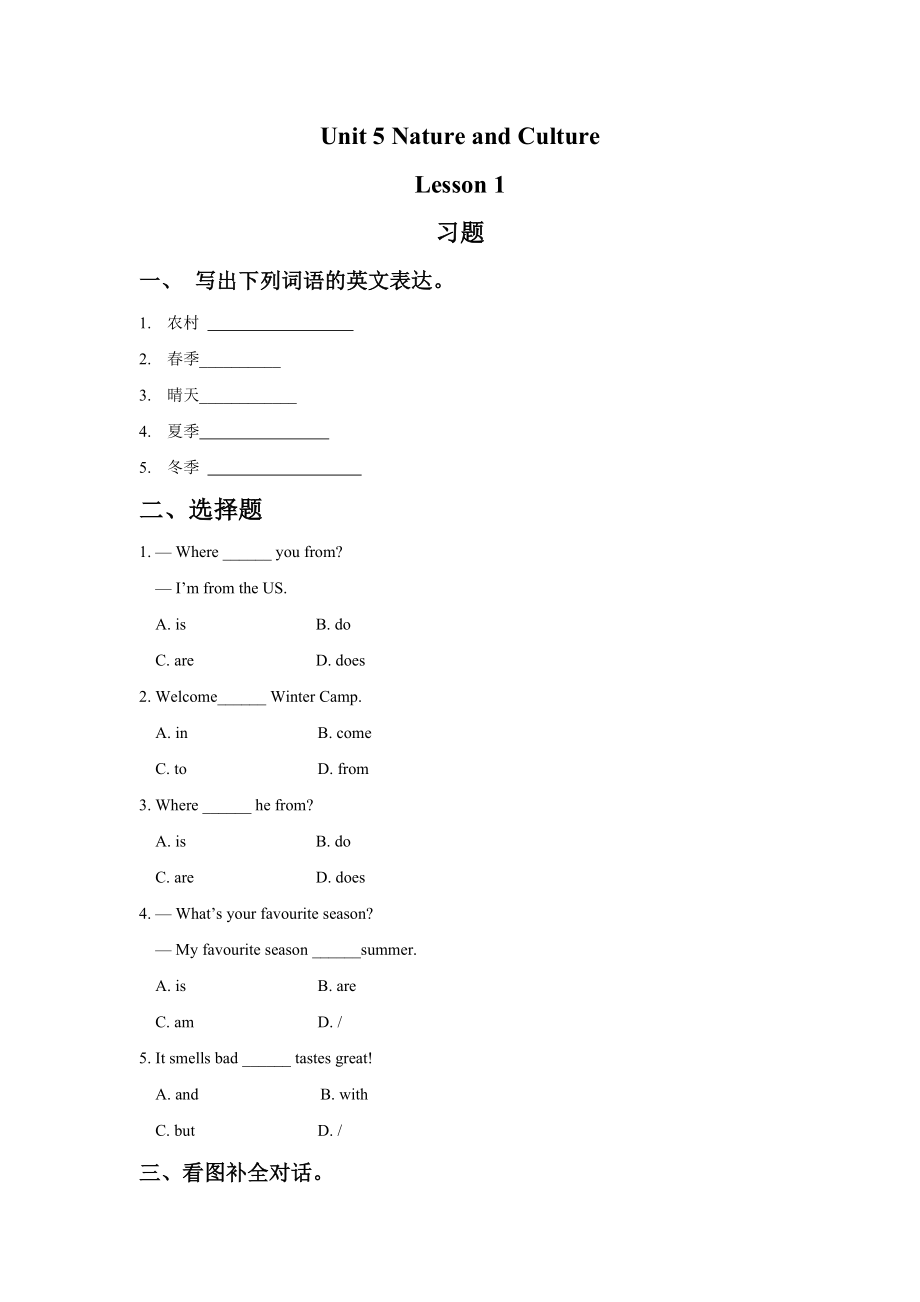《六年級下冊英語試題Unit 5 Nature and Culture Lesson 13 習(xí)題人教》由會員分享����,可在線閱讀,更多相關(guān)《六年級下冊英語試題Unit 5 Nature and Culture Lesson 13 習(xí)題人教(6頁珍藏版)》請在裝配圖網(wǎng)上搜索。
1����、Unit 5 Nature and Culture
Lesson 1
習(xí)題
一、 寫出下列詞語的英文表達(dá)����。
1. 農(nóng)村
2. 春季__________
3. 晴天____________
4. 夏季
5. 冬季
二、選擇題
1. — Where ______ you from?
— I’m from the US.
A. is B. do
C. are D. does
2. Welcome
2�����、______ Winter Camp.
A. in B. come
C. to D. from
3. Where ______ he from?
A. is B. do
C. are D. does
4. — What’s your favourite season?
— My favourite season ______summer.
A. is B. are
C. am D. /
5. It smells
3�、bad ______ tastes great!
A. and B. with
C. but D. /
三、看圖補全對話�。
1.— Where are you from?
— I’m from ________.
2.— Which season is it?
— It’s ________.
3.— Where is he from?
— He is from ________.
4. — Which season is it?
— It’s ________
4����、.
5.— ______ your favourite foods?
— My favourite food is jiaozi.
答案
一、countryside/ spring/ sunny/summer/ winter
二�����、CCAAC
三�、Canada/spring/ Japan/ autumn/ What’s
Lesson 2
習(xí)題
一、 漢譯英�。
1. 加拿大_______________________
2. 美國___________________________
3. 圣誕節(jié)________________
5�、________
4. 感恩節(jié)_________________
5. 火雞_______________
二����、選擇。
( ) 1.He is _____ Canada.
A. from B. go C. /
( ) 2.-How are you_____ celebrate?
A. go to B. going to C. will to D. /
( ) 3. - ___________________
-I’m going to China.
6�、 A. Where are you going?
B. What are you going?
C. Where is it
( ) 4.What your father do?
A. does B. gets to C. do
( ) 5. There a museum in the city.
A. is B. are C. have
三���、連詞成句����。
1. and, is, between, the, sports centre, the, bank, it, is
7���、 .
2. are, where, you, from
_ __
3. you, how, to, get, hospital, can, the
_________________________________________.
4. can, I, the, play, piano.
_________________________________________.
5. can, I, basketball, play,
8���、_________________________________________.
答案
一、1.Canada 2.America 3.Christmas Day 4.Thanksgivings Day 5.turkey
二�、ABAAA
三、1.It is between the bank and the supermarket.
2. Where are you from?
3. How can you get to the hospital?
4. I can play the piano.
5. I can play the basketbal
9�����、l.
Lesson 3
習(xí)題
一��、 寫出下列詞語的英文表達(dá)�。
1. 松鼠
2. 天鵝___________
3. 大雁
4. 青蛙
5. 猴子______________
二�����、 看圖填空���。
____________
__________
____________
三、句子翻譯�。
1. 你最喜歡的動物是什么? _______________________________
2. 動物們?nèi)绾纹桨策^冬�? ______________________
10、_________
3. 我喜歡松鼠�����。 _______________________________
4. 它們秋天收集很多食物����。 _______________________________
5. 它們冬天會冬眠。 _______________________________
答案
一����、1.squirrel 2.swan 3. wild goose 4.frog 5.monkey
語文課本中的文章都是精選的比較優(yōu)秀的文章,還有不少名家名篇����。如果有選擇循序漸進(jìn)地讓學(xué)生背誦一些優(yōu)秀篇目、精彩段落,對提高學(xué)生的水平會大有裨益?����,F(xiàn)在,不少語文教師在
11��、分析課文時,把文章解體的支離破碎,總在文章的技巧方面下功夫。結(jié)果教師費勁,學(xué)生頭疼���。分析完之后,學(xué)生收效甚微,沒過幾天便忘的一干二凈�。造成這種事倍功半的尷尬局面的關(guān)鍵就是對文章讀的不熟。常言道“書讀百遍,其義自見”,如果有目的�����、有計劃地引導(dǎo)學(xué)生反復(fù)閱讀課文,或細(xì)讀、默讀���、跳讀,或聽讀����、范讀�����、輪讀�����、分角色朗讀,學(xué)生便可以在讀中自然領(lǐng)悟文章的思想內(nèi)容和寫作技巧,可以在讀中自然加強語感,增強語言的感受力。久而久之,這種思想內(nèi)容�、寫作技巧和語感就會自然滲透到學(xué)生的語言意識之中,就會在寫作中自覺不自覺地加以運用、創(chuàng)造和發(fā)展�。二���、1.horse
2. lion
3.
4. 死記硬背是一種傳統(tǒng)的教學(xué)方
12�����、式,在我國有悠久的歷史�����。但隨著素質(zhì)教育的開展,死記硬背被作為一種僵化的��、阻礙學(xué)生能力發(fā)展的教學(xué)方式,漸漸為人們所摒棄;而另一方面,老師們又為提高學(xué)生的語文素養(yǎng)煞費苦心。其實,只要應(yīng)用得當(dāng),“死記硬背”與提高學(xué)生素質(zhì)并不矛盾�����。相反,它恰是提高學(xué)生語文水平的重要前提和基礎(chǔ)���。fox
三��、1. What’s your favourite animal?
2. How do animals spend winter safely?
3. I like squirrels.
4. They collect a lot of food in the autumn.
5.
6. 這個工作可讓學(xué)生分組負(fù)責(zé)收集整理,登在小黑板上,每周一換��。要求學(xué)生抽空抄錄并且閱讀成誦。其目的在于擴大學(xué)生的知識面,引導(dǎo)學(xué)生關(guān)注社會,熱愛生活,所以內(nèi)容要盡量廣泛一些,可以分為人生�����、價值、理想、學(xué)習(xí)����、成長、責(zé)任�、友誼���、愛心�����、探索、環(huán)保等多方面�。如此下去,除假期外,一年便可以積累40多則材料。如果學(xué)生的腦海里有了眾多的鮮活生動的材料,寫起文章來還用亂翻參考書嗎?They sleep long time in the winter.
 六年級下冊英語試題Unit 5 Nature and Culture Lesson 13 習(xí)題人教
六年級下冊英語試題Unit 5 Nature and Culture Lesson 13 習(xí)題人教

